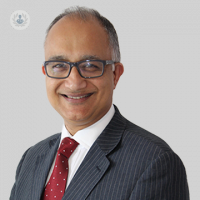Hysteroscopy: diagnosing abnormalities in the womb
Escrito por:We recently spoke with an extremely experienced consultant gynaecologist, Mr Sandeep Sharma, who frequently performs procedures to diagnose abnormalities in the womb.
We sat with him to discuss the many reasons someone may be recommended to have a hysteroscopy, what happens during the procedure, some of its risks and if there are any alternatives available.

Why would a patient need a hysteroscopy procedure?
Hysteroscopy may be necessary to diagnose abnormalities in the womb. This may be required during investigations of heavy periods, bleeding in between periods, infertility, unexpected cessation of periods, recurrent miscarriages or post-menopausal bleeding. The expected abnormalities can include endometrial polyps, fibroids, adhesions, cancer or developmental abnormalities of the womb.
What happens during the hysteroscopy procedure?
Hysteroscopy involves passing a telescopic camera (a hysteroscope) into the womb in order to examine the inside of the womb. This may be done under a local anaesthetic or a general anaesthetic. The local anaesthetic is performed by injecting an anaesthetic injection into the cervix in order to numb it. This is because the stretching of the cervix by the passing hysteroscope can be painful. The choice of anaesthetic is personal preference but recovery from local anaesthetic is much quicker.
Does my menstrual cycle affect when I can have a hysteroscopy?
Ideally, hysteroscopy is not done during a period so as to get better views of the womb. The second half of the menstrual cycle (i.e. within 2 weeks before a period) is better if a biopsy is also planned as the endometrium (lining of the womb) is thicker at this time. However, care must be taken to ensure that pregnancy is not a possibility.
Are there risks associated with a hysteroscopy?
There are uncommon risks such as minimal trauma to the cervix or sometimes trauma to the wall of the womb. This can result in some bleeding (often not worrisome) or infection. Complications are less likely if hysteroscopy is performed by experienced clinicians.
Are there alternatives to hysteroscopy that are equally as efficient?
An ultrasound scan of the pelvis (both with an abdominal and transvaginal probe) is very informative to suspect most of the abnormalities within the womb but hysteroscopy remains the gold standard investigation of choice.
If you feel you may benefit from a hysteroscopy or you are experiencing unusual symptoms that may be related to your womb or vaginal health, we recommend booking a consultation with Mr Sandeep Sharma. You can book a consultation via his Top Doctors profile.


